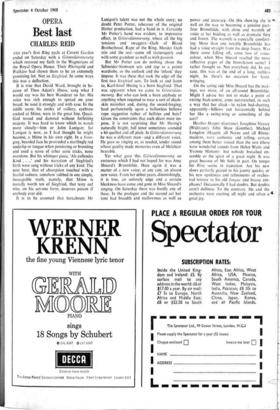Best last
OPERA CHARLES REID
this year's first Ring cycle at Covent Garden ended on Saturday with a GOtterdammerung which restored my faith in the Wagnerians of the Royal Opera House. Their Rheingold and Walkiire had shown them to be an extremely promising lot. Not so Siegfried. In some ways this was a deflection.
It is true that David Ward, brought in be- cause of Theo Adam's illness, sang what I would say was his best Wanderer so far. His voice was rich enough to spread on your bread; he used it strongly and with ease. In the riddle scene his smiles of raillery, eyebrow cocked at Mime, were in the great line. Quasi- God teased and damned without forfeiting majesty. It was hard to know which to watch more closely—him or John Lanigan; for Lanigan is now, as I had thought he might become, a Mime in his own right. In a frost- grey, bearded face he protruded a startlingly red underlip or tongue when pondering or brooding and used a score of other eerie tricks, none overdone. But his whimper piece, `Als zullendes Kind . . .,' and his narration of Siegfried's birth were sung without tricks of any kind. The note here, that of absorption touched with a fearful sadness, somehow rubbed in one simple, inescapable truth, namely, that Mime is morally worth ten of Siegfried, that testy oaf who, on his act-one form, deserves poison if anybody ever did.
It is to be assumed that hereabouts Mr Lanigan's talent was not the whole story; no doubt Peter Potter, rehearser of the original Hotter production, had a hand in it. Certainly Mr Potter's hand was evident, to impressive effect, in GOtterdiimmerung, where all the big tensions and swaggers—Oath of Blood Brotherhood, Rape of the Ring, Murder Oath trio and the rest—came off statuesquely and with some grandeur as well as with passion.
But Mr Potter can do nothing about the Schneider-Siemssen sets and (up to a point) wardrobe, or the outlook and the 'inlook' they impose. It was these that took the edge off the first two Siegfried acts. To look at and listen to, Karl-Josef Hering is a born Siegfried. That was. apparent when we came to Giitterdiinz- merung. But who can look a born anybody or anything when required to wear a sort of shark- skin minishirt and, during the sword-forging, haul perfunctorily upon a bellowless bellows rope suggestive rather of belfries and bats? Given the constraints that such decor must im- pose, it is not surprising that Mr Hering's naturally bright, full tenor sometimes sounded a bit quelled and off pitch. In Giitterdanunerung he was a different man—and a different voice. He gave us ringing or, as needed, tender sound whose quality made memories even of Melchior bearable.
Yet what gave this GOtteramtnerung an eminence which I had not hoped for was Amy Shuard's Briinnhilde. Here again it was a matter of a new voice; at any rate, an almost new voice. From her debut years, diminishingly, it is true, an unlovely edge and a certain bleakness have come and gone in Miss Shuard's singing. On Saturday there was hardly any of these. In the prologue and the second act her tone had breadth and mellowness as well as power and accuracy. On this showing she is 411" well on the way to becoming a genuine part- four Briinnhilde, with shine and warmth of voice at her bidding as well as dramatic fury and frown. The warmth is especially comfort- ing. More than one notable Briinnhilde has had a voice straight from the deep freeze. Was there some falling off, some loss of voice- colour, when Miss Shuard reached the more reflective pages of the Immolation scene? I rather thought so. Not everybody did. In any case, this was at the end of a long, ruthless night. So there's no occasion for hand- wringing.
On the acting side Miss Shuard has the mak- ings, not more, of an all-round Briinnhilde. Might I advise her not to make a point of exiting back-centre, arms outstretched, in such a way that her cloak—in nylon bed-sheeting, apparently—billows out horizontally behind her like a swing-wing or something of the sort?
Heather Harper (Gutrune). Josephine Veasey (Waltraute), John Shaw (Gunther), Michael Langdon (Hagen), all Norns and all Rhine- maidens, were authentic and telling, certain among them better voiced than the rest (there were wonderful sounds from Helen Watts and Yvonne Minton): but nobody breached en- semble or the spirit of a great night. It was great because of Mr Solti in part. On tempo his Ring seems in transition. Are his new slows perfectly geared to his jaunty quicks; or his new opulences and refinements of orches- tral texture to his old longue and brassy em- phases? Occasionally I had doubts. But doubts aren't dullness. To the contrary. He and the orchestra were exciting all night and often a4 great joy.






































 Previous page
Previous page